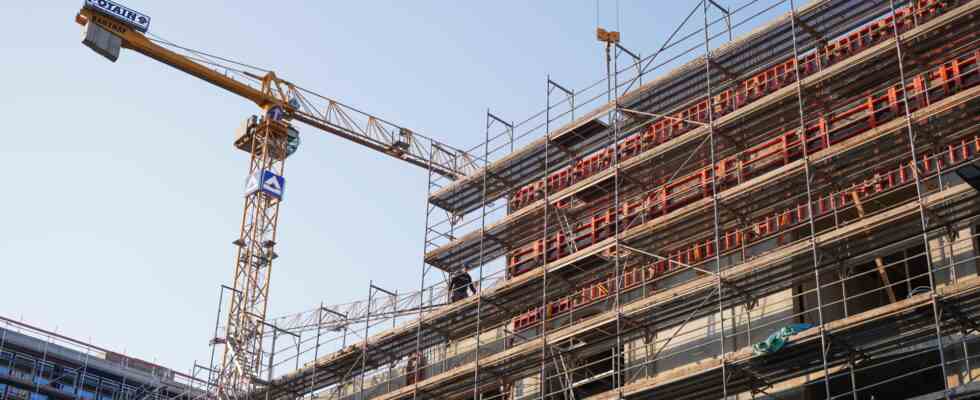analysis
Status: 01/12/2023 08:06 a.m
In Germany, the number of newly built apartments has fallen for the first time in a long time. Much more is needed because of immigration. Is the federal government setting the wrong incentives with its funding policy?
Germany is growing through immigration. But the number of apartments is not keeping pace with the higher demand. Social housing in particular falls far short of the federal government’s goals.
The past year brought about a turning point. But not the turnaround towards the 400,000 new apartments that the federal government has set as its goal. On the contrary: According to calculations by the German Institute for Economic Research, the real construction volume in 2022 fell for the first time in years, by around two percent. The Central Association of the German Construction Industry estimates that the number of newly built apartments has fallen to around 280,000.
Higher costs, higher interest – and less funding
Construction Minister Klara Geywitz (SPD) blames the increased construction costs for this. This made it difficult for many property developers to develop new projects. Added to this are the higher interest rates for building loans, which are causing problems for private home builders in particular.
However, many in the industry also see a shared responsibility for politics. Traditional housing subsidies have almost come to a standstill. Money from the state is almost only available for climate-friendly renovations. More than 13 billion euros are earmarked for this this year, they are in the budget of Economics and Climate Minister Robert Habeck. The new building, on the other hand, is only being funded with one billion euros – from the budget of the Minister of Construction.
A disproportion, complains Felix Pakleppa, General Manager of the Central Association of the German Construction Industry. He reminds that the new building was funded with ten billion euros in the first half of 2022. In view of the higher construction costs and the increased interest rates, the subsidy would be needed right now.
Social housing is also missing the target
There is additional money from the federal government for social housing – the annual subsidy was increased by Minister of Building Geywitz from one to two billion euros. But that’s not nearly enough, according to Matthias Günther, head of the Pestel Institute and author of a new study entitled “Housing in Crisis”. Because the increase in construction costs would immediately compensate for a large part of the funding. In other words, less new social housing can be built with the same amount of funding than two years ago.
The result: Social housing construction is also not getting anywhere. Instead of the 100,000 new social housing units targeted by the federal government, only around 20,000 social housing units were built last year.
Higher demand due to immigration
More social housing is needed right now, says Günther – and refers to immigration. After net immigration of a good 200,000 people in 2020 and more than 300,000 people in 2021, 1.5 million more people are likely to have come to Germany than left last year – that is exactly what the term net immigration means. “All of these people need rental housing,” says Pestel.
Against this background, the “Social Housing” alliance, which includes the German Tenants’ Association and the IG BAU trade union, is calling for a significant increase in state aid.
The Central Association of the German Construction Industry also advocates support for young families who want to build their own home. “We need a successor model for the child benefit,” says General Manager Pakleppa. One possibility is to reduce the real estate transfer tax.
Geywitz: Increasing productivity in the construction sector
Building Minister Geywitz is counting on further funding – but not just through additional funds. She points out that construction activity has already reached its limits in recent years: That’s why you can’t always just put more money into the system, because with limited capacities this would only further heat up the prices, she says in an interview with the ARD Capital Studio.
“Rather, we have to increase productivity in order to expand capacities in the construction sector.” She sees opportunities in the further digitization of the industry. The federal government is also working on simplifying approval and planning procedures.
Construction Minister Klara Geywitz visits a project for “serial and modular housing” in Berlin-Neukölln (archive).
Image: dpa
How much climate protection is needed?
However, climate protection requirements are also a major issue. For example, additional depreciation options, which are to be used to promote new construction starting this year, are linked to compliance with the EH 40 energy efficiency standard. This makes the funding unattractive for many investors.
Felix Pakleppa from the Central Association of the German Construction Industry complains that the specifications for social housing are too strict: If the government makes small cuts in its ambitious climate targets, housing construction could get going faster; With the current funding of two billion euros for social housing, more apartments could then be built.
Consultations with the associations
Construction Minister Klara Geywitz disagrees and refers to the rising energy costs: climate protection measures would help to limit the additional costs. Of course, this is only relevant for households that do not receive the majority of their energy costs as citizens’ income recipients.
At the same time, the SPD politician emphasizes that she takes the concerns of the construction and housing industry seriously. On Friday, she wants to speak behind closed doors with representatives of 17 associations that called for a course correction in construction policy in December in a joint appeal entitled “Dramatic situation in housing construction”. The federal government’s goal of building 400,000 new homes annually threatens to become “wishful thinking,” the appeal said.
Tenants’ association warns of massive spoilage on the housing market
Hans-Joachim Vieweger, ARD Berlin, 12.1.2023 8:17 a.m

